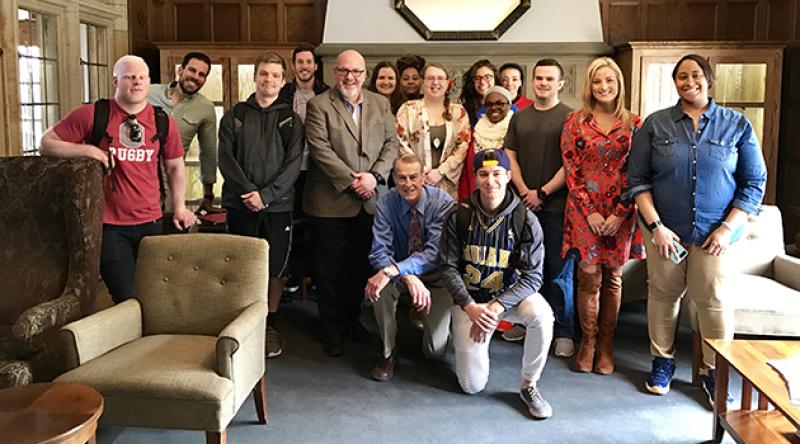Students in the Social Science Business Collaboration course (Sociology 4000E) have been hard at work this semester studying the challenges and impact of a community gardens project, working closely with Columbus businesses and community leaders. Andrew Martin, professor in the Department of Sociology, and Lindsey Chamberlain, assistant director of Ohio State Honors and Scholars, established the course in 2012 with the hope of providing students with the opportunity to engage in real-world research in an applied setting.
“We are looking at this course as a social entrepreneurship model,” said Chamberlain. “We started with some different iterations ... we worked with different companies on different projects, but we also became really interested in food. Food access (and) food deserts, especially here in Columbus, became the central issue for the class.”
Students worked in teams to define a problem related to community gardens and then created a research plan in order to solve that problem. They focused on a variety of issues, including how to make community gardens sustainable and how community gardens can lead to crime reduction.
“We wanted students to work directly with area businesses and nonprofit organizations to learn how networking and collaboration can improve the community,” Chamberlain said.
Students partnered with the Franklin County Commissioner’s Office, Lowe’s Home Improvement, Mid-Ohio Food Bank and St. Stephen’s Community House. Many of the guest speakers and community liaisons were only a few years older than the students, a component that both Martin and Chamberlain believed was important in order to show students the range of career possibilities they have after graduation.

“Students really connected with the people in the community and with our guest speakers,” said Martin.” “The experience expanded what they see as possible ... they see that they can be a real force for change and in a position to use what they’ve learned in sociology in a real way.”
Doug Brownfield, Lowe’s community liaison, worked closely with the class and helped connect students with a variety of speakers and partners from both the nonprofit sector and businesses working on the challenges of food instability.
“Without Doug’s help the class would not have been able to engage in these issues to the extent they have been able to do,” said Martin. “He went out of his way to make sure that our students had real face time with organizations and businesses that have been addressing food instability in Columbus and to see how collaboration is so critical to a successful action plan.”
Franklin County Commissioner John O’Grady was a guest speaker in the class. He shared insights into how government works, both at the local and national level and he talked about issues such as aging, food and transportation. Of particular importance, Commissioner O’Grady stressed the need for students to think broadly about their career choices to include experience in government and the nonprofit sector in addressing community challenges, such as food scarcity.
“Professor Martin, Assistant Director Chamberlain and Doug Brownfield have done a fantastic job structuring this class to truly engage the students in issues of great importance to the community, like food security,” said O’Grady. “It was a pleasure meeting and interacting with them in the classroom, and I’m certain they will build on the experience as the earnest and community-conscious leaders of tomorrow.”
Lauren Rigano, a fourth-year student studying political science and criminology, had never been involved in a community garden project prior to being enrolled in Sociology 4000E. She was surprised to learn about all the components that go into establishing a garden.
“The project was more than I expected it to be,” said Rigano. “Initially, I didn’t understand all the moving parts required to get a community garden in motion — it’s more than just finding a plot of land and planting fruits and vegetables. It requires daily work by multiple individuals, including understanding he community, getting community members involved in the garden and so much more.” Rigano was inspired by her class experience to continue helping with issues of food insecurity and plans to volunteer with the Mid-Ohio Food Bank.
“This project has given me a deeper understanding of the diverse communities surrounding Ohio State,” she said. “It really helped me better understand the different needs and desires of each community in correlation to their culture.”
For Martin and Chamberlain, the class challenges students to take what they have learned in the classroom and apply it to real-world problems and challenges.
“These students will be going out into the workforce soon, and we wanted them to confront real issues that required them to think on their feet, search for solutions and work as a team,” said Martin. “At the same time, they become familiar with the variety of roles in the business sector as well as the nonprofit sector available to them.”
